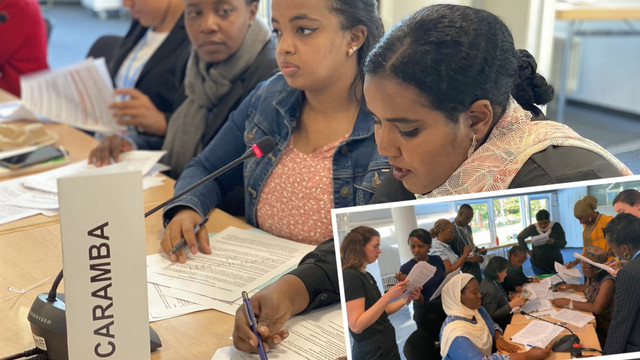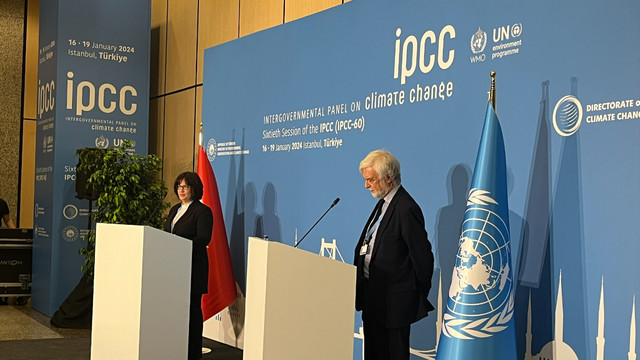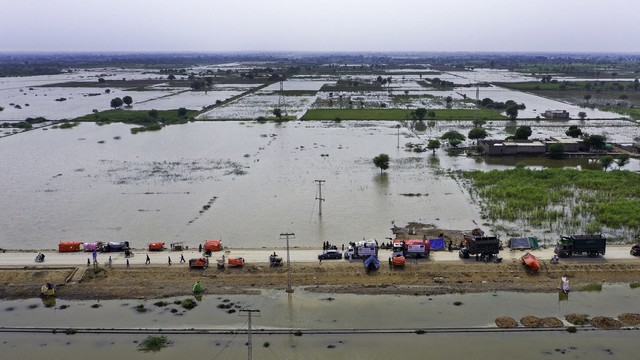LDCs and the Paris Agreement: getting to grips with tougher climate reporting
Implementing the Paris Agreement brings new reporting challenges for the least developed countries (LDCs). A recent IIED webinar explored ways forward for these countries to meet the treaty’s stringent transparency requirements.


During the webinar, Sudan was one of the countries sharing its reporting experiences under the UNFCCC (Photo: UN via Flickr, CC BY-NC-ND 2.0)
The Paris Agreement’s ‘enhanced transparency framework’ (ETF) marks a step-up in climate change reporting. This new transparency system is designed to increase ambition in delivering the climate action needed to limit global warming to 1.5C.
The ETF will track countries’ progress towards achieving their national emission reduction commitments, with both developed and developing countries required to work to these stringent new rules. The ETF does provide some reporting flexibility to developing countries. But the LDCs, with lower reporting capacity, risk falling behind.
Last week’s webinar heard LDC experiences and challenges of implementing the current framework, explored the support LDCs need, and looked at possible ways forward.
Tougher reporting ahead
Panellist Xuehong Wang, of the UNFCCC’s International Consultation and Analysis Support Unit, explained that, by the end of 2024, developing countries will need to submit their first biennial transparency reports (BTR). BTRs are more exacting than any previous reporting in terms of detail, methodologies and scope.
Countries are required to report on adaptation and mitigation activities, support received, and capacity building needs. This includes reporting how far they have delivered on their Nationally Determined Contributions – actions that countries plan to take to address climate change under the Paris Agreement.
Watch a full recording of the webinar below and on IIED's YouTube channel.
Current challenges
Wang explained that only seven of the 47 LDCs had reported against the existing, less demanding reporting framework, through the submission of biennial update reports (BURs). One of the main reasons for this was a lack of solid institutional arrangements – including the division of roles and responsibilities among the different agencies involved in monitoring and reporting of data.
This raises concern for the biennial reporting process which is more demanding in terms of collecting, analysing and processing information.
Following the overview from the UNFCCC, countries shared their individual experiences and challenges. Charles Asumana, project coordinator of Liberia’s first BUR, explained that, for Liberia, weak institutional arrangements had made accessing information challenging, while Yamikani Idriss, environmental officer from Malawi’s Ministry of Natural Resources, Energy and Mining, highlighted challenges of high staff turnover and the reliance on external consultants to prepare the reports.
But there has been progress, despite the obstacles. Rehab Ahmed Hassan, of Sudan’s Council for Environment and Natural Resources, shared how Sudan had established an in-country greenhouse gas inventory team with national experts and a shared data management system. In doing so, Sudan has improved its access to and analysis of information, and enhanced its ownership of the reporting process.
According to Wang, national teams’ struggles to fully grasp the different reporting requirements has been another obstacle for LDCs. In response, the UNFCCC Secretariat is preparing an LDC-targeted capacity-building training course that will be available online in September. The course will focus on addressing reporting requirements and improving implementation at the national level.
More support needed
While LDCs reporting capacity is low, LDCs have shown full commitment to the UNFCCC reporting process making every effort to comply with the complex reporting requirements. Many have submitted numerous reports – national communications, national adaptation plans, national greenhouse gas inventories – as well as actively participating in the negotiation process, and engaging with different constituted bodies and committees.
But if LDCs are to fully participate in the ETF process, they need adequate and long-term capacity building and financial support.
During the discussion, it was pointed out that increasing LDCs reporting figures and ensuring a smooth transition to the ETF will require coordinated efforts from governmental and non-governmental institutions within the countries, but also at the international level, across countries, with UNFCCC bodies including the Consultative Group of Experts, the Capacity Building Initiative for Transparency (CBIT), and with international cooperation agencies.
Reporting brings in-country benefits
While the ETF is designed to support global efforts to reduce the effects of climate change, the framework brings clear benefits for countries, helping them identify capacity gaps and needs, and generate key information, such as the greenhouse gas inventories, to design and implement their domestic climate policies.
As Rehab Hassam explained: “reporting to the UNFCCC is crucial for bringing climate change concerns to the attention of policymakers at the national level”. For Yamikani Idriss, meeting the reporting requirements is also important for showcasing Malawi’s ambitious domestic climate action, policies and strategies to the international community.
Preparing for transition
The webinar’s discussion highlighted the importance of LDCs participating in the current monitoring and reporting process to gain experience before the ETF becomes operational. Since the ETF builds on the UNFCCC’s existing transparency requirements, countries with experience on the current process will be better prepared for transitioning to the ETF.
Submitting their BUR supports this transition – helping LDCs better understand the reporting requirements, receive guidance from technical experts, and promote mutual learning among parties by sharing best practices.
Watch these three short pre-recorded clips of LDCs reporting experts – from Malawi, Liberia and Sudan – discussing their reporting experiences and challenges. You can view the webinar presentations below:
- Xuehong Wang: Transition to the Enhanced Transparency Framework (ETF) under the Paris Agreement
- Yamikani Idriss: Malawi's experience in reporting under the UNFCCC
- Charles Asumana: Liberia
- Rehab Ahmed Hassan: Sudan reporting experience
All the presentations are available via IIED's Slideshare platform.




